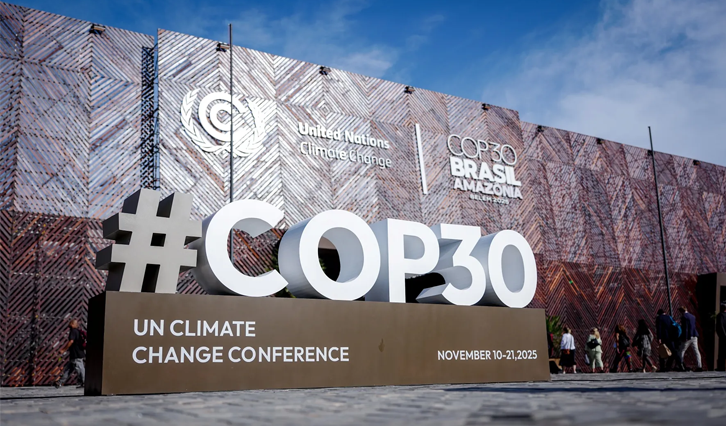What will COP30 mean for climate action?
Dafna Rand, the 2025–2026 Robert E. Wilhelm Fellow, examines how the annual COP conference reflects shifting global power dynamics and signals a new era of multilateralism.
Dafna Rand, the 2025–2026 Robert E. Wilhelm Fellow, examines how the annual COP conference reflects shifting global power dynamics and signals a new era of multilateralism.

View of the entrance to the COP30 World Climate Conference.
The United Nations’ annual climate conference, now in its 30th year, continues to reflect changing global power dynamics—shedding light on unique attributes of 21st-century multilateralism.
In 1945, a group of large powers, those who had prevailed in World War II, set the rules of the road, including by designating five countries as U.N. Security Council veto holders. At COP, thanks to its consensus-based decisionmaking norms, medium-sized states—and their small state supporters—enjoy significant influence. Whether bigger or smaller carbon emitters, resource-rich or resource-poor, small island states or the world’s largest ones, COP’s participants enjoy at least the veneer of equal status.
In the first decades after the establishment of the United Nations and the Bretton Woods institutions, public actors were expected to resolve debates about international trade, international law, and global norms in multilateral arrangements. At COP, by contrast, the private sector is ever-present and highly vocal, while trade relations that span across the public and private spheres are often determinant. That’s why corporations, including those from America’s vast renewable energy sector, will flock to COP again this year. Unfortunately, Trump administration officials, having decided to boycott COP30, will not be present in order to promote these American businesses interested in gaining global market footholds.
If past is precedent, this year at Belém, Brazil, the Global South will use its influence—and the power of its numbers—to continue to demand compensation for loss and damages from more developed countries, mainly in the form of fulfilling the developed countries’ commitments to the climate finance fund. Climate justice at COP is understood as reparative and collective—focusing on specific communities and societies. This differs from the original concept of universal human rights—and its focus on the individual—that was so central to the foundation of the United Nations system in the 20th century.
How COP negotiation groups in Belem emerge still remains an unknown. If the BRICS bloc of developing countries, led by their Brazilian host, begins to negotiate as a group during the formal negotiations track, then we will see yet another sign that a new age of multilateralism has formally arrived.